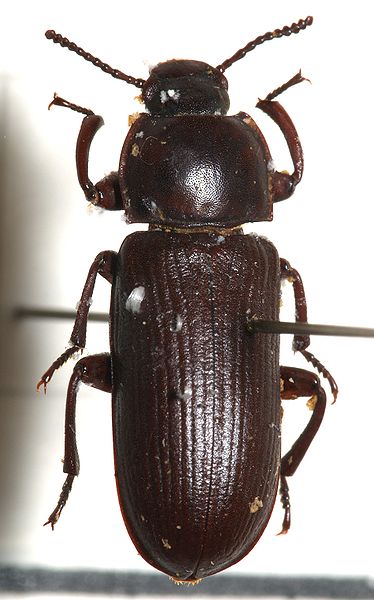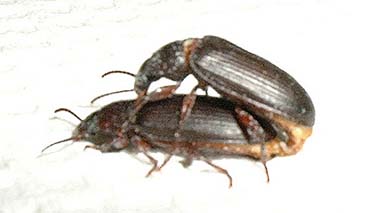Sorry about the long hiatus! It’s grant-writing season, and so I’ve been working feverishly to write proposals to fund my dissertation research. On the plus side, I came across some cool stuff while researching my project. First up, sexy beetles!
How does living in a world full of parasites change the effort you should put into being attractive to the opposite sex?
 Kivleniece and colleagues set out to answer this question in the latest issue of the journal Animal Behaviour (the paper can be found here).
Kivleniece and colleagues set out to answer this question in the latest issue of the journal Animal Behaviour (the paper can be found here).
Dealing with parasites can be costly. Mounting an efficient immune response is energetically expensive, and let’s not forget about the potential risk of death if the parasite is dangerous enough, or if less dangerous parasites are encountered too regularly. Organisms have to make decisions about how to use their limited energetic resources, because resources used for one purpose are no longer available to be used for others. For example, energy spent on maintaining a strong immune system can’t be spent on traits that make an individual more attractive to the other sex.
To explore trade-offs between the immune response and, well, sexiness, the authors convinced mealworm beetles (Tenebrio molitor) that they lived in environments which differed in parasite risk. When nylon monofilament (think fishing line) is inserted into the body of a mealworm beetle, the beetle’s immune systems responds as if it is being invaded by a parasite. In both cases, it forms a capsule around the object, and this capsule would suffocate or poison a parasite if one were present. The immune system responds quickly, creating this capsule in a matter of hours.
The researchers simulated a successful immune system response to a parasite by inserting a nylon implant for 5 hours, letting the host immune system respond, and then removing the implant. Measuring the degree to which the nylon implant was encapsulated revealed how strong of an immune response the beetle had mounted. Multiple “parasite” encounters were simulated by repeatedly inserting and then removing the nylon implant.
Next it was time to bring in the ladies. Females in this system choose their mate based at least in part by their pheromones (chemical signals). Males can modify how attractive their pheromones are, but increasing pheromone sexiness presumably has energetic costs, and may therefore be impossible to do while maintaining an aggressive immune system. When females were presented with a male who had never been parasitized and a male who has been parasitized once, they showed a clear preference for unparasitized males. This suggests that the parasitized males are diverting energy away from sexy pheromones and are instead putting that energy towards maintaining a strong immune system, ready to pounce on the next parasite it encounters. Indeed, the researchers exposed these males to another nylon implant after the female choice test, and these males mounted a strong encapsulation response to the implant.
OK, so one parasite encounter makes males less attractive, but what about multiple encounters? When it looks like parasites are going to be a recurring problem, is it smarter to consistently maintain a heightened immune response, or is it better to shift focus towards reproduction?
To address this question, females were allowed to choose between males who were unparasitized, parasitized once, or parasitized repeatedly. Males who were parasitized once were undoubtedly the least attractive, but, surprisingly, the sexiest males where the ones who had encountered parasites repeatedly.
 So why the heck are females choosing repeatedly parasitized males? Well, the males appear to be making a trade-off between being intensely sexy now, but dying shortly thereafter, as opposed to be moderately sexy but long-lived. Males who are parasitized once mount a massive immune response, in the hope of making a full recovery and living a long, moderately sexy life. Males who are parasitized repeatedly realize that they risk never being attractive to the ladies because they’re constantly going to be putting their energy into defeating parasites. These males decide to forsake their immune system (they became much less efficient at encapsulating the nylon implant), and instead put their energy into making themselves sexy. They probably achieved this by improving the quality of their pheromones, which chemically wooed their mate.
So why the heck are females choosing repeatedly parasitized males? Well, the males appear to be making a trade-off between being intensely sexy now, but dying shortly thereafter, as opposed to be moderately sexy but long-lived. Males who are parasitized once mount a massive immune response, in the hope of making a full recovery and living a long, moderately sexy life. Males who are parasitized repeatedly realize that they risk never being attractive to the ladies because they’re constantly going to be putting their energy into defeating parasites. These males decide to forsake their immune system (they became much less efficient at encapsulating the nylon implant), and instead put their energy into making themselves sexy. They probably achieved this by improving the quality of their pheromones, which chemically wooed their mate.
These ultra-sexy males paid a high cost for forsaking their immune system. In the month following the mate choice experiment, only 44% of the repeatedly parasitized males were still alive. On the other hand, the 92% of the unparasitized and 88% of the once parasitized males were still alive. Most interestingly, only 11 of the 50 multiply parasitized males were not favored by females in the mate choice test, and 10 out of these 11 were still alive by the end of the month. These rejects decided to go with longevity, and increased their immune response at the sake of sexiness in order to buy themselves some more time.
Take-home lesson (if you’re a beetle): Attractiveness can be manipulated. If you suddenly find someone much more attractive that you did previously, check them for parasites.

So…you’re telling me that beetle-chicks like bad boys? Living on the edge, facing death… not giving a frell? God dang.
This is just like that episode of Futurama.
Fry gets worms, and suddenly leela wants to date him, then realizes it’s just the parasites.
I think this sexy beetle article could make for a good SMBC comic. If already done, could you please post the URL?
Zach has not done a comic about this. Sorry!